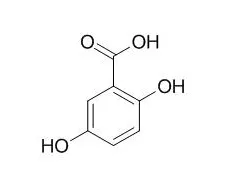| Description: |
Gentisic acid, an active metabolite of salicylic acid degradation, has a broad spectrum of biological activity, such as antibiotic, anti-inflammatory, antirheumatic and antioxidant properties; it also has antimutagenic/protective effects that may contribute to human health. Gentisic acid has protective effect against cyclophosphamide induced genotoxicity and hepatotoxicity in Swiss albino mice. |
| In vitro: |
| Drug Chem Toxicol. 2017 May 16:1-7. | | Cytotoxicity, mutagenicity, and antimutagenicity of the gentisic acid on HTC cells.[Pubmed: 28511592 ] | Gentisic acid (GA) exhibits antioxidant, anti-inflammatory, and antibiotic activities. This substance can be found in citrus fruits, grapes, olive oil, and peas.
METHODS AND RESULTS:
Considering that there are few studies in the literature on the toxicity of GA, the present work aimed to investigate its cytotoxic, mutagenic, and antimutagenic activities on HTC cells. GA was diluted in culture medium at the final concentration of 0.08, 0.16, 0.8, 1.6, and 8 μg/mL. The cytotoxicity was determined by the MTT assay and Trypan Blue exclusion method, with methyl methanesulfonate and doxorubicin as positive controls, respectively. The cytokinesis-block micronucleus assay determined the mutagenic/antimutagenic activity with benzo[a]pyrene as positive control. Negative control received culture medium only. GA (0.08-8 μg/mL) was not cytotoxic to HTC cells by the MTT assay nor the Trypan Blue exclusion method as no statistical difference was observed when compared to the control. Concentration of 0.08 and 0.8 μg/mL showed no mutagenic or clastogenic effects, as no significant micronuclei inductions were observed, different from 8 μg/mL, that was mutagenic. Furthermore, none of the concentrations presented an antiproliferative activity. The antimutagenic activity of GA (0.08 μg/mL) was observed at the simultaneous treatment, as it reduced the frequency of micronuclei by 76% (24 h) and 79% (48 h). Although pre- and post-treatments were not statistically different from the mutagen, they reduced the induced-damage by 11% and 21%, respectively.
CONCLUSIONS:
The present study indicated the absence of cytotoxicity and antiproliferative activities of GA, in addition to their antimutagenic/protective effects that may contribute to human health. | | Eur J Pharmacol. 2005 Apr 25;513(3):173-9. | | Gentisic acid, an aspirin metabolite, inhibits oxidation of low-density lipoprotein and the formation of cholesterol ester hydroperoxides in human plasma.[Pubmed: 15862799] | Gentisic acid, an aspirin metabolite, has an antioxidant effect, although its detailed mechanism remains elusive.
METHODS AND RESULTS:
The present study was designed to determine whether it inhibits low-density lipoprotein (LDL) oxidation and the formation of lipid hydroperoxides in human plasma. The susceptibility of LDL oxidative modification was investigated by a method using 2,2'-azobis or Cu2+. To study the effect of Gentisic acid on free radical-induced damage to plasma lipids, cholesterol ester hydroperoxides generated by incubating human fresh plasma with Cu2+ and Gentisic acid was analyzed. Gentisic acid inhibited LDL oxidation in a concentration-dependent manner. It significantly inhibited the formation of cholesterol ester hydroperoxides in plasma, and was consumed after the depletion of ascorbic acid and reduced form of coenzyme Q-10 (CoQH2-10), whereas concentrations of other antioxidants remained unchanged.
CONCLUSIONS:
Gentisic acid had a potent free radical scavenging activity with a minimal chelating effect. The potent antioxidant property of Gentisic acid may partly account for the anti-atherogenic effects of aspirin. |
|






 Cell. 2018 Jan 11;172(1-2):249-261.e12. doi: 10.1016/j.cell.2017.12.019.IF=36.216(2019)
Cell. 2018 Jan 11;172(1-2):249-261.e12. doi: 10.1016/j.cell.2017.12.019.IF=36.216(2019) Cell Metab. 2020 Mar 3;31(3):534-548.e5. doi: 10.1016/j.cmet.2020.01.002.IF=22.415(2019)
Cell Metab. 2020 Mar 3;31(3):534-548.e5. doi: 10.1016/j.cmet.2020.01.002.IF=22.415(2019) Mol Cell. 2017 Nov 16;68(4):673-685.e6. doi: 10.1016/j.molcel.2017.10.022.IF=14.548(2019)
Mol Cell. 2017 Nov 16;68(4):673-685.e6. doi: 10.1016/j.molcel.2017.10.022.IF=14.548(2019)